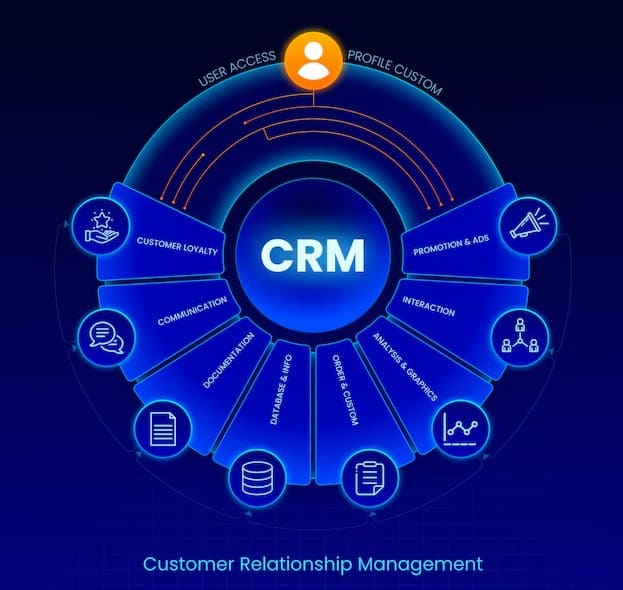Revolutionizing Real Estate CRM Systems: Must-Have Features
The real estate market is booming rapidly. In this fast-paced industry, staying organized, managing leads, and nurturing client relationships are essential for success. For real estate business owners, doing all these is not easy along with focusing on their core business activities.
This is where modern technology expands its arms for help. CRM software is what every real estate business owner needs to tackle difficult tasks with ease. Think of them as your reliable assistant, always there to lend a hand in keeping everything running smoothly, enhancing communication, and fueling business growth.
However, not every CRM is tailored to the specific needs of real estate professionals. So, let’s take a closer look at what real estate CRM systems are, why they are important, and some essential features that every real estate CRM should offer to simplify life for real estate business owners.
What is a Real Estate CRM System?
A CRM or customer relationship management system is a powerful digital tool that enables real estate businesses to efficiently manage their interactions with clients, leads, and industry contacts. They also help in managing various tasks carried out by real estate firms and agents.
In other words, a real-estate CRM system is designed to centralize and streamline all aspects of the client lifecycle, from lead generation to closing deals and beyond. CRM solutions have a high relevance in the real estate market due to benefits they offer like improving business relations management and clarifying market segmentation.
Why CRM Systems are Important for Real Estate Business?
Real estate businesses come across various interactions and data that must be tracked and well-coordinated. A CRM system is important for real estate firms to tackle the internal issues of managing clients, properties, and transactions simultaneously.
Without a robust CRM system in place, real estate agents risk losing track of leads, missing important deadlines, and ultimately losing out on potential deals. CRM systems provide a comprehensive view of each client’s journey, from initial contact to final closing, enabling real estate business owners to deliver personalized services and build lasting relations with their clients.
Thus, having a CRM system for your real estate business is more than just an investment, it is important to keep your business on the path of success while tackling unpredictable challenges.
Must-Have Features for Real Estate CRM
A well-designed CRM can significantly enhance business efficiency, improve customer relationships, and drive sales. However, all CRM systems are not built similarly and they cannot meet the unique needs of every real estate business. To truly revolutionize the real estate industry, a CRM must offer features tailored to its unique challenges and opportunities.
So, here are some must-have features for a cutting-edge real estate CRM system:
Efficient Lead Management
A real estate business can get leads from multiple sources such as the company’s website, social media feeds, and property portal listings. Thus, a CRM must have efficient lead management tools that can capture, organize, and prioritize leads.
They should have a tracking feature to monitor agent interaction, an assignment feature to sort leads, and a workflow to guide leads through the conversion process. CRM systems must also have automation features like follow-up reminders, email drip campaigns, and lead scoring to ensure no opportunities are missed.
Mobile Compatibility
Real estate agents are always on the move and they need to access CRM data anytime, anywhere. Mobile compatibility of real estate CRM systems is essential to allow agents to work with leads, edit property data, communicate with clients, and monitor transactions using mobile devices such as smartphones and tablets.
Beyond basic mobile access, a CRM system must leverage advanced functionalities like geo-targeting to identify leads or properties based on proximity, enhancing the agent’s ability to make informed decisions on the go.
Integration with Third-Party Tools
A real estate CRM system should work well with the other critical tools and platforms your business relies on daily. Whether it’s accounting software, marketing automation systems, or calendar applications, a well-integrated CRM acts as the central nervous system of business operations.
Seamlessly integrating data from various sources provides a comprehensive business view, enabling real estate business owners to make informed and strategic decisions. Additionally, Integration with email and messaging platforms can increase productivity in communication with clients.
Property Tracking
Effective property tracking is essential for real estate agents to stay organized and informed about their listings. CRM systems should offer robust property tracking features that allow agents to manage their listings effectively and efficiently.
With an ideal real estate CRM, agents can create detailed property profiles for each listing, including property type, location, price, features, and photos. These profiles can be easily accessed and updated, ensuring that agents have accurate and up-to-date information at their fingertips.
Document and Contract Management
Deals and transactions in the real estate industry rely heavily on documentation and contracts. An ideal CRM system for real estate businesses must offer robust documentation and contract management features to securely store, manage, and share critical documents and also streamline the entire process through automation.
CRM should have features like automated template generation to easily create standard forms, e-signature integration to accelerate the approval process, and transaction tracking to keep every contract on track.
Integration of MLS
Integration of multiple listing services or MLS directly into a real estate CRM system can significantly transform the operational efficiency of businesses. This eliminates the hassle of toggling between multiple platforms by providing real-time property listings, enabling new property data to flow directly into your CRM.
Integration with property portals ensures that inquiries from these portals are automatically routed into your CRM. These leads are often highly qualified and time-sensitive and converting them quickly into potential customers can give a competitive advantage.
Advanced Analytics and Reporting
Data is the key to unlocking success in the real estate industry. An ideal real estate CRM should include advanced analytics and reporting tools that provide real-time insights. From monitoring sales pipelines to tracking agent productivity, these features empower businesses to make data-driven decisions.
Detailed reports allow you to see which marketing strategies are working, how efficiently your agents are closing deals, and how client behavior is evolving. CRM systems can also leverage the use of AI for advanced data analytics.
Conclusion
Real estate businesses not only need exceptional agents and prime properties to grow in this highly competitive market. To truly excel, they need a feature-loaded CRM system that propels their business from reactive to proactive. The right CRM system can prove to be a game-changer for real estate businesses.
Revolutionalizing real estate CRM systems is not just about adding new features, it’s more about solving real problems for real estate businesses. An ideal CRM system can transform how real estate agents interact with clients, manage properties, and grow their businesses.
As technology continues to evolve, investing in a robust, feature-rich CRM has become a necessity to stay competitive in the real estate industry.




